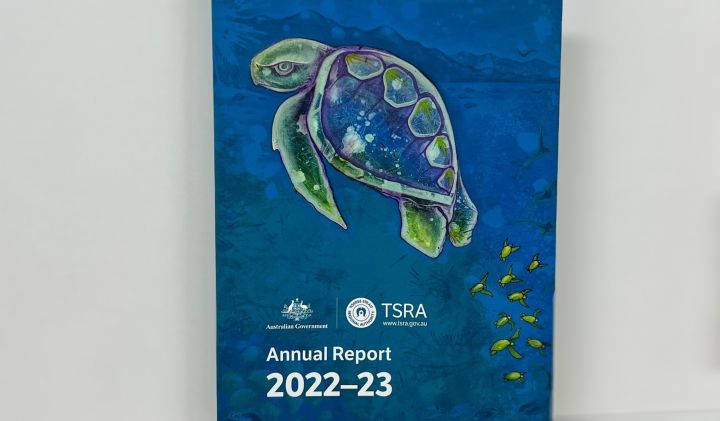
The Torres Strait Regional Authority’s (TSRA) latest Annual Report 2022-2023 was tabled in the Australian Parliament last month (31 October 2023), detailing outcomes delivered directly through its program areas and in partnership with communities, government and non-government agencies.
Highlights included the TSRA-supported Torres Strait Major Infrastructure Programme (MIP) reaching the significant 25-year milestone delivering $300 million of major environmental health infrastructure projects in the Torres Strait and Northern Peninsula Area. Continuing to improve the health of Torres Strait Islander and Aboriginal people, the latest stage MIP stage 6 was completed in 2022-2023 delivering $30 million worth of projects.
Other outcomes reported included 34 executed grants worth $2.9 million across priority areas, and TSRA as a Protected Zone Joint Authority (PZJA) partner supporting the formal re-opening of the high value sea cucumber fisheries generating a significant economic boost for Traditional Inhabitant Boat (TIB) Licence holders.
TSRA Chairperson Napau Pedro Stephen AM said the TSRA Board continued to ensure their 20 communities throughout the region were represented and benefitted from the delivery of TSRA program activities and projects.
“We continue to advocate to the highest decision makers in Australia, and in 2022-2023 hosted the Australian Prime Minister Anthony Albanese, Minister for Indigenous Australians Linda Burney and Ambassador for First Nations People Justin Mohamed ensuring the needs of the region remain highly visible and a funding priority,” Mr Stephen said.
TSRA Chief Executive Officer Vonda Malone said she was proud of TSRA’s operational outcomes in 2022-2023 that reflected its role as the region’s leading Australian Government agency to successfully advocate, monitor and coordinate regional efforts with other government agencies.
“A key success indicator for the TSRA is our ability to connect key partners who include and value Torres Strait Islander and Aboriginal perspectives across policies, decisions and investment. The outcomes achieved in 2022-2023 reflect our ‘partnerships for success’ approach as we continue to progress toward TSRA’s purpose of Closing the Gap for Torres Strait Islander and Aboriginal people living in the region,” Ms Malone said.
Mr Stephen thanked Deputy Chairperson Horace Baira, who was Acting TSRA Board Chairperson for a substantial time during the reporting period.
“I also acknowledge and thank the TSRA Board Members, Chief Executive Officer and staff for their dedication and effort in what was another challenging but successful year,” Mr Stephen said.
Other highlights from the TSRA’s work in 2022–23 include:
- Torres Strait Maritime Pathways Project supported 4 courses and 48 participants to complete a Certificate II in Maritime Operations (Coxswain Grade 1 Near Coastal).
- Twelve “You Sabe Business” courses delivered on Waiben (Thursday Island) to a total of 84 participants (each attended 3 sessions) with 96 per cent of participants surveyed as satisfied with the workshops.
- Mentoring support provided for 8 new and existing local businesses.
- Growing Our Own Tagai Transitions Maritime Project with Tagai State College and TAFE Queensland enabled 42 school students to undertake maritime operations, first aid and safety courses.
- For university students, 11 TSRA Assistance with Tertiary Education Scheme scholarships supported students enrolled in studies including nursing, arts, environmental practice, physiology, education, midwifery, architecture, and urban design.
- 80+ artists and cultural practitioners sold their artworks or products and participated in or facilitated workshops and activities through the Gab Titui Cultural Centre.
- 40+ art and cultural activities facilitated collectively attracted more than 1,500 participants, including local community members and visitors.
- 90 per cent of TSRA staff identify as Torres Strait Islander and/or Aboriginal.
- Over half the total workforce are women and more than one third of Rangers are female.
The TSRA was established on 1 July 1994 and next year celebrates its 30th Anniversary.
Download the TSRA Annual Report at www.tsra.gov.au or follow us on Facebook.
About the TSRA
As one of the most remote Australian Public Service (APS) agencies, the TSRA supports programs across the Torres Strait region, including for the 17 inhabited islands of the Torres Strait and the communities of Bamaga and Seisia on the Northern Peninsula Area of mainland Australia.
The Torres Strait stretches 150 kilometres northwards from Cape York Peninsula to Papua New Guinea (PNG) and up to 300 kilometres from east to west. The TSRA is the lead Australian Government agency in the Torres Strait region for Indigenous Affairs.
The TSRA operates under the direction of a democratically elected Torres Strait Islander and Aboriginal Board, comprising of 20 members representing the communities of the region.
It currently has the highest level of female representation since its establishment, with 6 women representing the communities of Bamaga, Seisia, Kubin, Masig, Warraber and Saibai.

